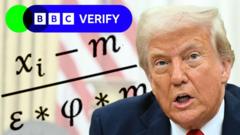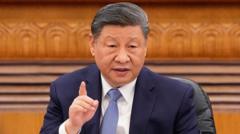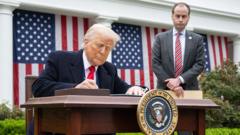In a surprising move, Russia was not included in the latest list of tariffs issued by former President Donald Trump, a decision that many in the West find disappointing. The exclusion can largely be attributed to the existing sanctions placed on Russia by the US following its invasion of Ukraine in 2022. White House Press Secretary Karoline Leavitt confirmed that the already imposed sanctions hinder any meaningful trade with Russia, a sentiment echoed by various Russian media outlets.
Russia Excluded From Trump's Latest Tariff Announcement

Russia Excluded From Trump's Latest Tariff Announcement
Trump's recent tariff list omits Russia, prompting mixed reactions from global observers.
Fox News reports that countries such as Cuba, Belarus, and North Korea also failed to make the tariff list, with trade between the US and these nations being negligible. On the other hand, Syria, which traded a mere $11 million in goods with the US last year, found itself included.
Despite Trump taking a generally welcoming stance toward Russia upon his return to the White House, his administration is actively pursuing negotiations to end the ongoing conflict in Ukraine. Recently, he threatened to impose a hefty 50% tariff on nations purchasing Russian oil unless President Putin agreed to a ceasefire, showcasing the complexity of his foreign policy.
Russian media, particularly state-controlled outlets, have been quick to assert that the lack of tariffs is not a favor but rather a result of existing sanctions. Commentary from channels such as Rossiya 24 and NTV has reflected a mocking tone towards Western responses. Claims that Trump's tariff policies unfairly burden European allies were made, pointedly referring to the inclusion of deserted islands within the list, critiquing the inaccuracy of the sanctions approach.
Ukraine, in contrast, was not spared from Trump's tariffs, facing a 10% tax on its exports to the US, which could pose significant challenges for smaller Ukrainian producers. Deputy Prime Minister Yulia Svyrydenko indicated that they are negotiating to secure better trading terms, highlighting the importance of Ukraine as a strategic ally to the United States.
Although the trade figures between the US and Russia remain relatively low—with imports valued at $3.5 billion in 2024, primarily consisting of fertilizers and metals—this latest tariff decision has stirred various international reactions, demonstrating the nuanced dynamics of global trade and foreign relations.
Despite Trump taking a generally welcoming stance toward Russia upon his return to the White House, his administration is actively pursuing negotiations to end the ongoing conflict in Ukraine. Recently, he threatened to impose a hefty 50% tariff on nations purchasing Russian oil unless President Putin agreed to a ceasefire, showcasing the complexity of his foreign policy.
Russian media, particularly state-controlled outlets, have been quick to assert that the lack of tariffs is not a favor but rather a result of existing sanctions. Commentary from channels such as Rossiya 24 and NTV has reflected a mocking tone towards Western responses. Claims that Trump's tariff policies unfairly burden European allies were made, pointedly referring to the inclusion of deserted islands within the list, critiquing the inaccuracy of the sanctions approach.
Ukraine, in contrast, was not spared from Trump's tariffs, facing a 10% tax on its exports to the US, which could pose significant challenges for smaller Ukrainian producers. Deputy Prime Minister Yulia Svyrydenko indicated that they are negotiating to secure better trading terms, highlighting the importance of Ukraine as a strategic ally to the United States.
Although the trade figures between the US and Russia remain relatively low—with imports valued at $3.5 billion in 2024, primarily consisting of fertilizers and metals—this latest tariff decision has stirred various international reactions, demonstrating the nuanced dynamics of global trade and foreign relations.





















